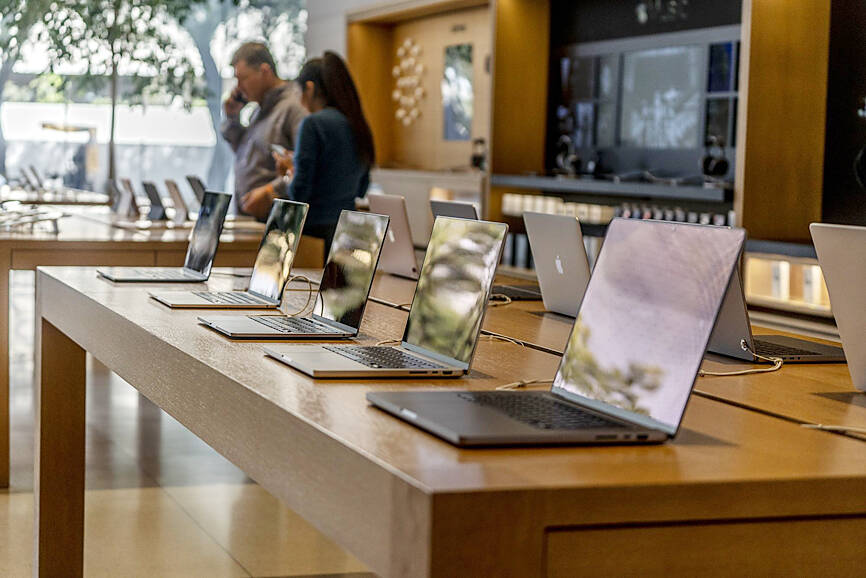Apple Inc’s PC shipments plunged 40.5 percent year-on-year in the first quarter of the year, marking a tough start to the year for PC makers still grappling with a glut of unsold inventory.
Shipments by all PC makers combined slumped 29 percent year-on-year to 56.9 million units — and fell below the levels of early 2019 — as the demand surge driven by the COVID-19 pandemic-era remote work evaporated, International Data Corp (IDC) said in a report on Sunday.
Among the market leaders, Lenovo Group Ltd (聯想) and Dell Technologies Inc registered drops of more than 30 percent, while HP Inc was down 24.2 percent. No major brand was spared from the slowdown, with Asustek Computer Inc (華碩) rounding out the top five with a 30.3 percent fall.

Photo: Bloomberg
The slowdown in consumer spending over the past year has led to double-digit declines in smartphone shipments and an accumulating glut among the world’s foremost memorychip suppliers.
Samsung Electronics Co, which provides memory chips for portable devices, as well as desktops and laptops, last week said it was cutting memory production after reporting its slimmest profit since the global financial crisis of 2008-2009.
“Though channel inventory has depleted in the last few months, it’s still well above the healthy four to six week range,” IDC research manager Jitesh Ubrani said in the report. “Even with heavy discounting, channels and PC makers can expect elevated inventory to persist into the middle of the year and potentially into the third quarter.”
A silver lining is that the cooling demand is giving manufacturers the time and room “to make changes as many factories begin to explore production options outside China,” IDC said in the report.
The IDC researchers foresee a potential rebound for PC makers this year, driven by a combination of aging hardware that will need to be replaced and an improving global economy.

Taiwan Semiconductor Manufacturing Co (TSMC, 台積電) yesterday said that its investment plan in Arizona is going according to schedule, following a local media report claiming that the company is planning to break ground on its third wafer fab in the US in June. In a statement, TSMC said it does not comment on market speculation, but that its investments in Arizona are proceeding well. TSMC is investing more than US$65 billion in Arizona to build three advanced wafer fabs. The first one has started production using the 4-nanometer (nm) process, while the second one would start mass production using the

‘SILVER LINING’: Although the news caused TSMC to fall on the local market, an analyst said that as tariffs are not set to go into effect until April, there is still time for negotiations US President Donald Trump on Tuesday said that he would likely impose tariffs on semiconductor, automobile and pharmaceutical imports of about 25 percent, with an announcement coming as soon as April 2 in a move that would represent a dramatic widening of the US leader’s trade war. “I probably will tell you that on April 2, but it’ll be in the neighborhood of 25 percent,” Trump told reporters at his Mar-a-Lago club when asked about his plan for auto tariffs. Asked about similar levies on pharmaceutical drugs and semiconductors, the president said that “it’ll be 25 percent and higher, and it’ll

CHIP BOOM: Revenue for the semiconductor industry is set to reach US$1 trillion by 2032, opening up opportunities for the chip pacakging and testing company, it said ASE Technology Holding Co (日月光投控), the world’s largest provider of outsourced semiconductor assembly and test (OSAT) services, yesterday launched a new advanced manufacturing facility in Penang, Malaysia, aiming to meet growing demand for emerging technologies such as generative artificial intelligence (AI) applications. The US$300 million facility is a critical step in expanding ASE’s global footprint, offering an alternative for customers from the US, Europe, Japan, South Korea and China to assemble and test chips outside of Taiwan amid efforts to diversify supply chains. The plant, the company’s fifth in Malaysia, is part of a strategic expansion plan that would more than triple

Taiwanese artificial intelligence (AI) server makers are expected to make major investments in Texas in May after US President Donald Trump’s first 100 days in office and amid his rising tariff threats, Taiwan Electrical and Electronic Manufacturers’ Association (TEEMA, 台灣電子電機公會) chairman Richard Lee (李詩欽) said yesterday. The association led a delegation of seven AI server manufacturers to Washington, as well as the US states of California, Texas and New Mexico, to discuss land and tax issues, as Taiwanese firms speed up their production plans in the US with many of them seeing Texas as their top option for investment, Lee said. The